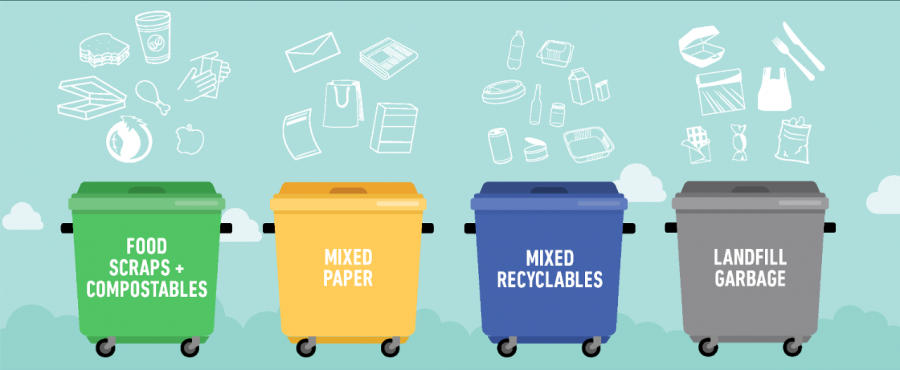Reduce
- Reduce your waste, the ultimate goal is to go to zero waste.
- Reduce your purchases – think about the product you want to buy before if you really need it and try the 30-Day Rule (wait 30 days after you made the decision to buy this item and decide then if you really need it).
- Borrow from/share with friends, ask your friends when you need a thing only temporary before you buy it.
- Shopping bags – bring your own bag with you.
- Waste-Free lunches – use boxes instead of plastic bags or wrap
- Mug-to-Go – carry your own mug with you.
- Create a tree-free home:
- replace paper towels with cloth towels
- buy bleach free toilet paper
- switch to digital organizer
- read books, newspaper etc. online
Reuse
- Donate or sell/buy used items on:
- eBay
- local thrift stores
- garage sales
- Save and reuse kitchen items, like paper bags, rubber bands, boxes and twisties. Use reusable containers instead of plastic bags.
- Pick up books from a library or used bookstores. In the library, you may find a lot more than just books, even magazines CD’s, DVD’s etc.
- Buy rechargeable batteries and a battery charger, it is also possible to purchase solar powered recharger.
- Switch to reusable drinking bottles like glass or metal ones, instead of plastic bottles.
Recycle
- Use various bins to separate your waste e.g.:
- glass
- paper
- plastic
- metal
- biowaste
Refuse
- Refuse products, that create waste. Try to purchase from the bulk and produce sections of the grocery store and bring your own bags or boxes, to avoid plastic bags and package waste.
- Avoid plastic single-use items, like cups, plates, straws, shopping bags etc. Choose instead reusable products.
Eating habits
- Support your local farmer markets and buy organic, local food. Each pound of local food you buy prevents a quarter pound of CO2 emissions.
- Reduce food waste and buy only the items you need. If food waste would be a country, it would be the third largest emitter of CO2 of the world. Nearly ⅓ of food which is produced every year gets wasted.
- Avoid GMO (genetically modified organism) products.
- Eat unprocessed/unpackaged food whenever possible.
Conserve energy
- Don’t wait to start conserving energy as you can to reduce your climate change emissions! Set goals to reduce your energy usage:
- For example, commit to using 20% less energy per month and use the money to do something fun with your family or friends.
- Buy energy saving products.
- Buy green energy, choose a company which focused on renewable energy.
- Wash your clothes with cold water, this saves 90% of your laundry energy. Dry your laundry on a clothesline, this cuts out 4.4pounds of CO2 per load of laundry.
- Reduce your standby power. Switch off your devices at home while you are not at home or at work.
Conserve water
- Only 3% of the earth’s water is freshwater, we must protect this critical resource and take action today to protect our future.
- Set goals to reduce water consumption.
- Run always full loads of laundry and dishes and choose eco-running
- Drink tap water (if it’s drinkable in your country).
Out in nature
- Take your trash with home, when you’re on a hike. Pick up trash if you see some along the way.
- Do not release balloons outdoors. Most of the time they find their way to open waters and can harm or kill animals.
- Visit and help support your local parks.
For more and detailed information follow this link!
